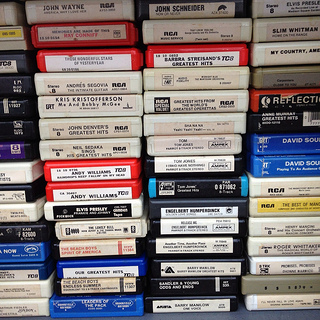 Have you ever bought a CD or MP3s of the very same album you own on cassette tape or vinyl? Or even, for those of you old enough to remember, the legendary 8-track tape (pictured)? Of course you have. We all have. Or maybe it was a Blu-Ray disc of a favorite movie that you had on VHS. The point is we all do it.
Have you ever bought a CD or MP3s of the very same album you own on cassette tape or vinyl? Or even, for those of you old enough to remember, the legendary 8-track tape (pictured)? Of course you have. We all have. Or maybe it was a Blu-Ray disc of a favorite movie that you had on VHS. The point is we all do it.
Format matters. And yet every time we do this we are perpetuating a system that charges us for the same content over and over again. With formats changing on an ever-faster cycle, this problem will only get worse.
With ebooks time doesn’t even have to pass for this to occur, as there is no universally-accepted format for ebooks. You could end up buying a book for one device and have to buy it again for another. Libraries find themselves in this pickle all of the time. How many libraries had (or still do) large collections of vinyl records? Cassette tapes? Too many.
When publishers of all kinds made the transition from physical to digital, they made the claim that most of the value was in the intellectual content, and the editorial processes they provided, and not the cost of the carrier. Well if that’s truly the case, then why must the hapless library or consumer be required to pay for that multiple times?
It’s time for a format fee.
By this I mean that if you own a licensed copy of a given collection of content, you should be able to turn that in and pay a small fee to have it on a different format. After all, you’ve already paid for the intellectual content and any editorial processes it took to provide that content. Having to pay again is simply a rip-off.
Will publishers go for this? They just might. As fewer and fewer people build personal collections of physical artifacts holding their tunes, movies, and books, they will look for ways to spur sales. One way might be to lower the risk of obsolescence. After getting burned by accumulating movies in VHS, then on DVD, and watching both formats fall into obsolescence, I doubt many people are rushing to collect Blu-Ray discs. And such a development could only help libraries bring their collections back from the brink of obsolescence.
Photo by Phillip Pessar, Creative Commons License Attribution 2.0 Generic.


Yes, please! Content owners like to talk about some “license” they think they offered and I accepted. So they should pack it in the box with the product, and I should be able to show the license and say “I already paid for this; just sell me another copy of the content I licensed on suchandso medium for $2 (which is about a 50% profit for you).”